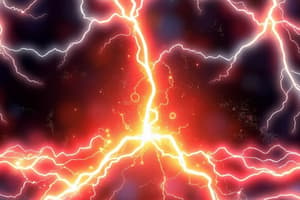Podcast
Questions and Answers
What is the magnitude of the electronic charge?
What is the magnitude of the electronic charge?
- 9.1x10^-31 C
- 1.6x10^-27 C
- 1.6x10^-19 C (correct)
- 2.7x10^-27 C
Which subatomic particle has a charge of +1e?
Which subatomic particle has a charge of +1e?
- Electron
- Proton (correct)
- Neutron
- Alpha particle
What is the charge of a neutron?
What is the charge of a neutron?
- +2e
- +Ze
- -Ze
- -2e (correct)
How does the mass of a proton compare to that of a neutron?
How does the mass of a proton compare to that of a neutron?
Which subatomic particle is located in the nucleus of an atom?
Which subatomic particle is located in the nucleus of an atom?
What property remains constant in an isolated system?
What property remains constant in an isolated system?
In the context of conservation of charge, what happens when one charged system interacts with another identical charged system?
In the context of conservation of charge, what happens when one charged system interacts with another identical charged system?
If a system has a total charge of 6.25x10^18, how much charge would each identical system have in a pair of interacting systems?
If a system has a total charge of 6.25x10^18, how much charge would each identical system have in a pair of interacting systems?
What happens to the total charge when an isolated system interacts with another system that is not identical?
What happens to the total charge when an isolated system interacts with another system that is not identical?
If a charged system interacts with another identical charged system and the total charge is 100 N, what is the individual charge on each system?
If a charged system interacts with another identical charged system and the total charge is 100 N, what is the individual charge on each system?
Flashcards are hidden until you start studying
Study Notes
Properties of Charge
- Charge is a scalar quantity.
- Charge is additive, meaning the total charge of a system is the sum of the individual charges.
Quantisation of Charge
- Charge is quantized, meaning it comes in discrete packets (quanta).
- The charge on a body is an integer multiple of the charge on an electron (e).
- The total charge on a system is given by the algebraic sum of the charges (with signs).
Conservation of Charge
- The total amount of charge on an isolated system is conserved.
- Charge cannot be created or destroyed, only transferred from one body to another.
Electronic Charge
- The magnitude of the electronic charge (e) is 1.6 × 10^-19 C.
- The charge on an electron is -e, while the charge on a proton is +e.
Units and Measurements
- The unit of charge is the coulomb (C).
- The mass of an electron is 9.1 × 10^-31 kg, while the mass of a proton is 1.6 × 10^-27 kg.
Types of Charge
- There are two types of charge: positive and negative.
- A body with no net charge is said to be neutral.
- A body with an equal number of positive and negative charges is also neutral.
Studying That Suits You
Use AI to generate personalized quizzes and flashcards to suit your learning preferences.




